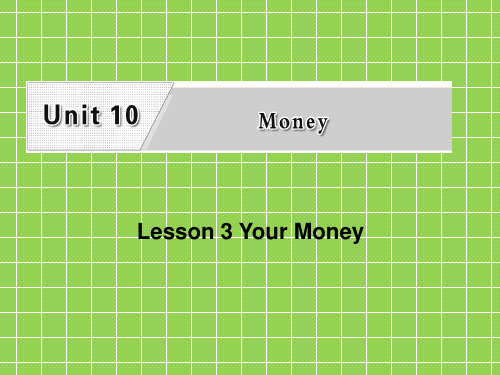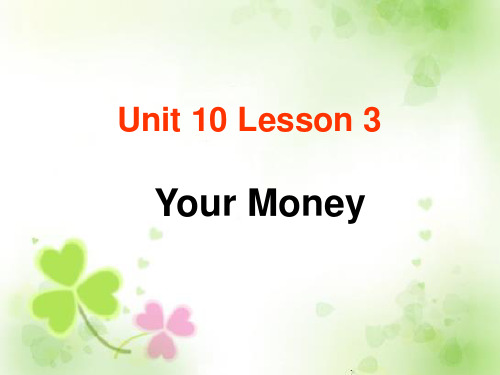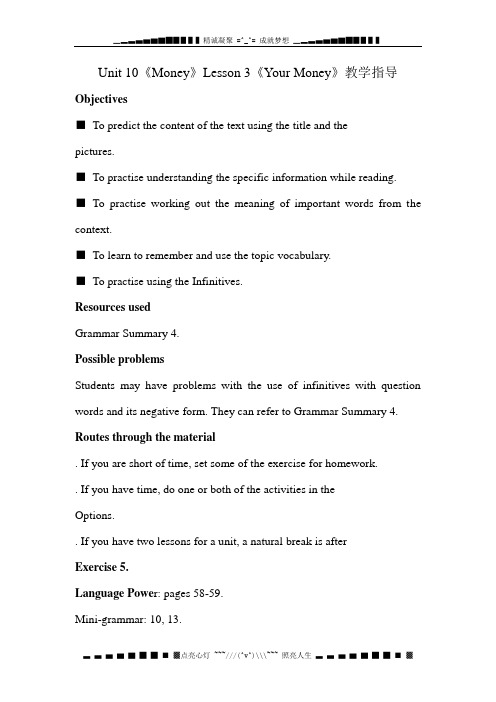高中英语_Unit10_Lesson3_Your_money课件_北师大版必修4
- 格式:ppt
- 大小:2.52 MB
- 文档页数:25






Unit 10《Money》Lesson 3《Your Money》教学指导Objectives■To predict the content of the text using the title and thepictures.■To practise understanding the specific information while reading.■To practise working out the meaning of important words from the context.■To learn to remember and use the topic vocabulary.■To practise using the Infinitives.Resources usedGrammar Summary 4.Possible problemsStudents may have problems with the use of infinitives with question words and its negative form. They can refer to Grammar Summary 4. Routes through the material. If you are short of time, set some of the exercise for homework.. If you have time, do one or both of the activities in theOptions.. If you have two lessons for a unit, a natural break is afterExercise 5.Language Powe r: pages 58-59.Mini-grammar: 10, 13.ReadingBefore you startExercise 1■Look at the title of the unit with the students. Ask them if they and their friends often talk about money. Tell them that in Britain, most older people don’t discuss their own money with others (e.g. how much they earn, how much they paid for their house or their car). Younger people in the UK talk about their finances more freely.■Ask students to discuss in pairs how much pocket money they get each month and during the Spring Festival.Exercise 2■Ask students whether they spend or save their monthly pocket money and their money for the Spring Festival.■Students discuss in pairs what things they spend their money on. Ask them to add things to the Key Words if there are any.■Ask some students to report about their partners. But before that, they had better ask for permission from their partners.■Elicit as many things as possible from students that they would like to add to the Key Words.Language Power: the Word Corner on page 59 practisesvocabulary from the text.Read to learnExercise 3■Encourage students to predict what the article is about by skimming the pictures above the article, the title of the lesson “Your Money” and the title of the article “When Less is More”.■Ask them to read the paragraph in italics to check whether their predictions are true or not.■Students scan the newspaper article and try to work out the meaning of the words.■Check their answers by asking students to tell in which line the word is found and how they can work out the meaning of the words. Give one or two examples before starting.For example:The man made a great fortune from the stock market. People are firmly convinced that they will ultimately win the war.Answers1 approximately2 ecological3 erosion4 massive5 view6 fortune7 precious8 fertile9 convinced 10 paradise.Exercise 4■Students read the article again and in pairs, ask and answer the questions.■After checking the answers, ask students to work in pairs and discuss the meaning of the title “When Less is More”.Answers1 the Yellow River2 Fugu County in Shaanxi Province3 Planting trees.4 Because it can buy a precious tree.5 The Jiuchegong Valley in Inner Mongolia.Exercise 5■Students work in pairs working on the question. Ask them to take notes if necessary.■Ask some pairs to report their result of the discussion. Have a class discussion if possible.■Encourage students to put their ideas into action.Language StudyINFINITIVESExercise 6■Students work on the sentences individually.■When checking the answers, ask students to translate the sentences.■Encourage students to make their own sentences with some of the words.Answers1 Approximately2 erosion3 fortune4 fertile5 convinced6 paradise7 precious8 point of view■Ask students to underline the infinitives while reading the sentences. Students discuss in pairs how the Infinitives are used.■Refer students to Grammar Summary 4 and ask them to understand the use of infinitives.■Check the answers and provide more examples of the Infinitives for students.Answers1 to keep used as Attributive of the sentence2 to move used as Object Complement of the sentence3 to control used as Subject of the sentence4 to develop used as Object of “help”5 how to use used as Object of the phrasal verb “think about”6 to make a living used as Adverbial of purpose of the sentence7 fertile is an infinitive without “to”, used as Object completed of the sentence.Exercise 8■Students work on the sentences individually and then check their answers in pairs. Note that one word is not used.Answers1 to stay2 to make3 to take4 to learn5 to persuade6 to damage7 to show8 to create9 to deal with■Students complete the dialogues choosing the Infinitive.■After checking the answers, students roleplay the dialogue to further understand them.■Ask students whether they know such a person as Pete and what they think of him/her.Answersto buy to choose to buy spent save borrow to lend to giveLanguage in UseExercise 10■Students write on their own and then ask two or three students to present their writing.■Tell students that they may use some presentation skills, for instance, drawing a rough pie chart to show the proportion.OptionsPracticeAsk students to think of the money they have spent in the last week and what they have spent it on. Each student then writes sentences using some of the expressions they have practiced in the unit. If you wish, give them an example: “Last week, I spent quite a lot of money and I only saved a little.I bought a lot of food with most of the money because I had a party at theweekend. All my friends came to the party. Some of them sat in the garden, talking and others were dancing in the sitting room.”ExtensionIn groups, students prepare another questionnaire. Give them a choice of topics. They can continue the questionnaire in the book (‘How careful are you with money?’) and add more questions, or they can choose a new topic e.g. ‘How careful are you with your health? How generous are you with your money? How good a fr iend are you?’ Remind students to do an Answer Key for their questionnaire so that the results can be interpreted. When the groups have written their questionnaires they canexchange them for other students to complete.。
Unit 10《Money》Lesson 3《Your Money》教学指导Objectives■To predict the content of the text using the title and thepictures.■To practise understanding the specific information while reading.■To practise working out the meaning of important words from the context.■To learn to remember and use the topic vocabulary.■To practise using the Infinitives.Resources usedGrammar Summary 4.Possible problemsStudents may have problems with the use of infinitives with question words and its negative form. They can refer to Grammar Summary 4. Routes through the material. If you are short of time, set some of the exercise for homework.. If you have time, do one or both of the activities in theOptions.. If you have two lessons for a unit, a natural break is afterExercise 5.Language Powe r: pages 58-59.Mini-grammar: 10, 13.ReadingBefore you startExercise 1■Look at the title of the unit with the students. Ask them if they and their friends often talk about money. Tell them that in Britain, most older people don’t discuss their own money with others (e.g. how much they earn, how much they paid for their house or their car). Younger people in the UK talk about their finances more freely.■Ask students to discuss in pairs how much pocket money they get each month and during the Spring Festival.Exercise 2■Ask students whether they spend or save their monthly pocket money and their money for the Spring Festival.■Students discuss in pairs what things they spend their money on. Ask them to add things to the Key Words if there are any.■Ask some students to report about their partners. But before that, they had better ask for permission from their partners.■Elicit as many things as possible from students that they would like to add to the Key Words.Language Power: the Word Corner on page 59 practisesvocabulary from the text.Read to learnExercise 3■Encourage students to predict what the article is about by skimming the pictures above the article, the title of the lesson “Your Money” and the title of the article “When Less is More”.■Ask them to read the paragraph in italics to check whether their predictions are true or not.■Students scan the newspaper article and try to work out the meaning of the words.■Check their answers by asking students to tell in which line the word is found and how they can work out the meaning of the words. Give one or two examples before starting.For example:The man made a great fortune from the stock market. People are firmly convinced that they will ultimately win the war.Answers1 approximately2 ecological3 erosion4 massive5 view6 fortune7 precious8 fertile9 convinced 10 paradise.Exercise 4■Students read the article again and in pairs, ask and answer the questions.■After checking the answers, ask students to work in pairs and discuss the meaning of the title “When Less is More”.Answers1 the Yellow River2 Fugu County in Shaanxi Province3 Planting trees.4 Because it can buy a precious tree.5 The Jiuchegong Valley in Inner Mongolia.Exercise 5■Students work in pairs working on the question. Ask them to take notes if necessary.■Ask some pairs to report their result of the discussion. Have a class discussion if possible.■Encourage students to put their ideas into action.Language StudyINFINITIVESExercise 6■Students work on the sentences individually.■When checking the answers, ask students to translate the sentences. ■Encourage students to make their own sentences with some of the words.Answers1 Approximately2 erosion3 fortune4 fertile5 convinced6 paradise7 precious8 point of view■Ask students to underline the infinitives while reading the sentences. Students discuss in pairs how the Infinitives are used.■Refer students to Grammar Summary 4 and ask them to understand the use of infinitives.■Check the answers and provide more examples of the Infinitives for students.Answers1 to keep used as Attributive of the sentence2 to move used as Object Complement of the sentence3 to control used as Subject of the sentence4 to develop used as Object of “help”5 how to use used as Object of the phrasal verb “think about”6 to make a living used as Adverbial of purpose of the sentence7 fertile is an infinitive without “to”, used as Object completed of the sentence.Exercise 8■Students work on the sentences individually and then check their answers in pairs. Note that one word is not used.Answers1 to stay2 to make3 to take4 to learn5 to persuade6 to damage7 to show8 to create9 to deal with■Students complete the dialogues choosing the Infinitive.■After checking the answers, students roleplay the dialogue to further understand them.■Ask students whether they know such a person as Pete and what they think of him/her.Answersto buy to choose to buy spent save borrow to lend to giveLanguage in UseExercise 10■Students write on their own and then ask two or three students to present their writing.■Tell students that they may use some presentation skills, for instance, drawing a rough pie chart to show the proportion.OptionsPracticeAsk students to think of the money they have spent in the last week and what they have spent it on. Each student then writes sentences using some of the expressions they have practiced in the unit. If you wish, give them an example: “Last week, I spent quite a lot of money and I only saved a little.I bought a lot of food with most of the money because I had a party at theweekend. All my friends came to the party. Some of them sat in the garden, talking and others were dancing in the sitting room.”ExtensionIn groups, students prepare another questionnaire. Give them a choice of topics. They can continue the questionnaire in the book (‘How careful are you with money?’) and add more questions, or they can choose a new topic e.g. ‘How careful are you with your health? How generous are you with your money? How good a friend are you?’ Remind students to do an Answer Key for their questionnaire so that the results can be interpreted. When the groups have written their questionnaires they canexchange them for other students to complete.。